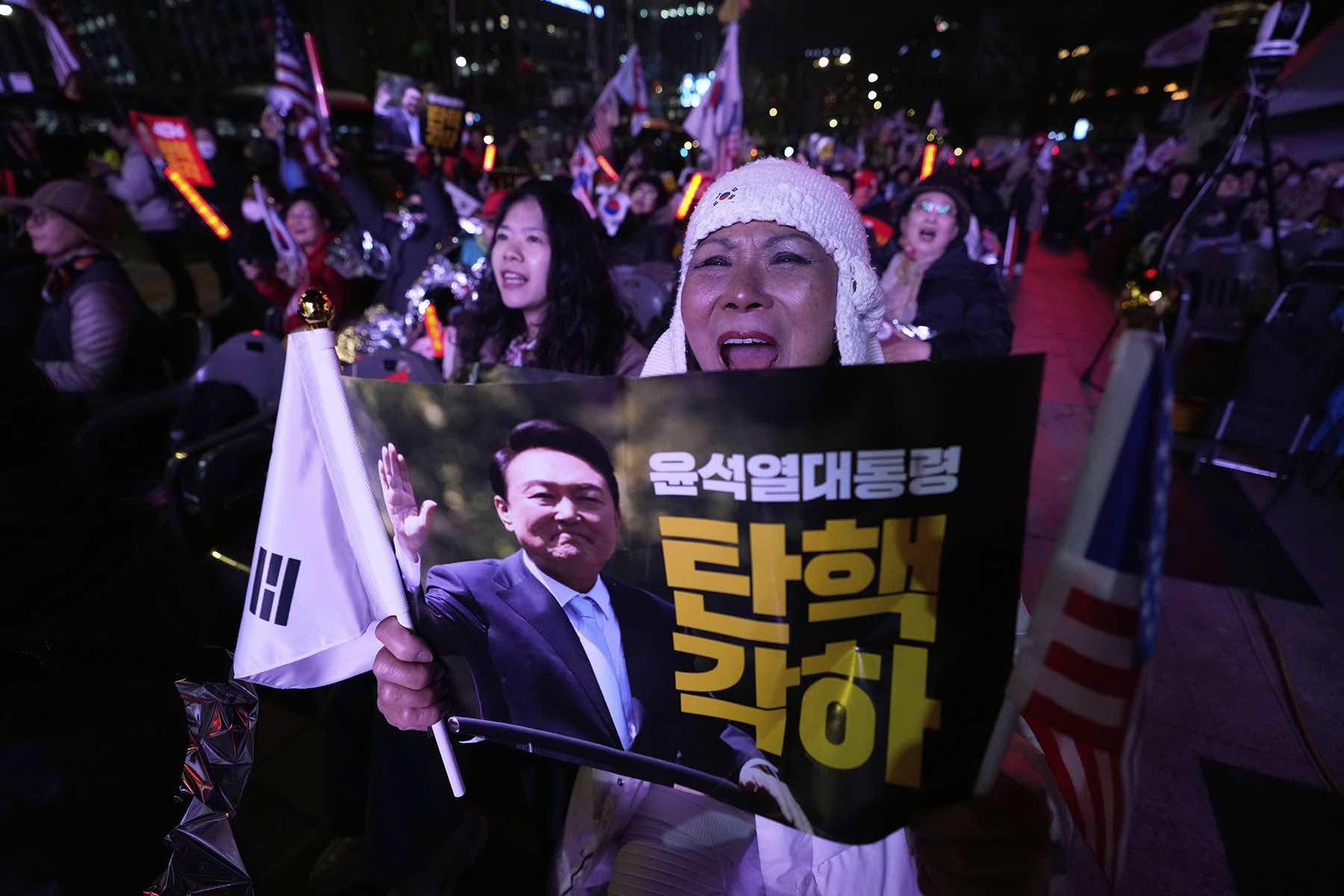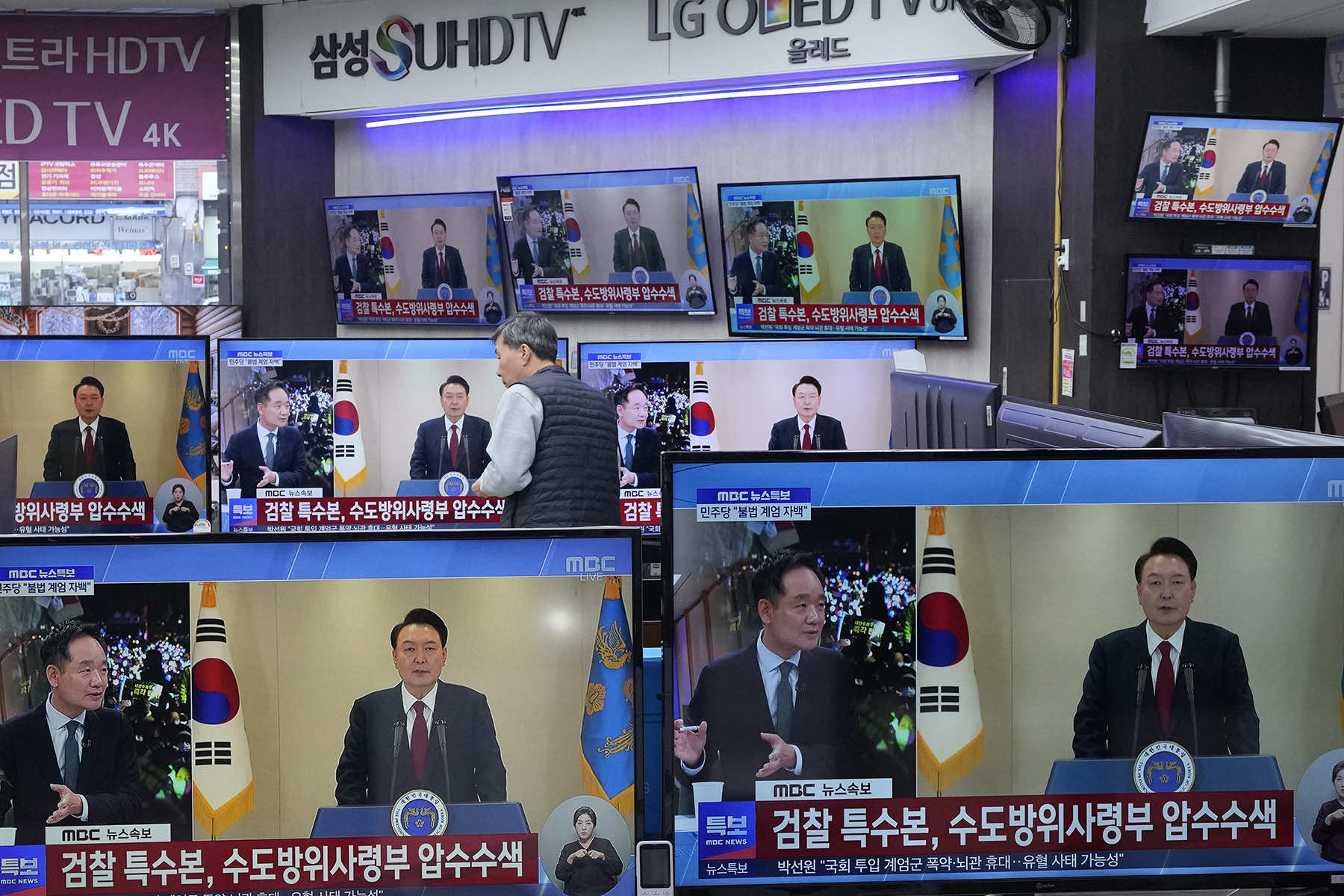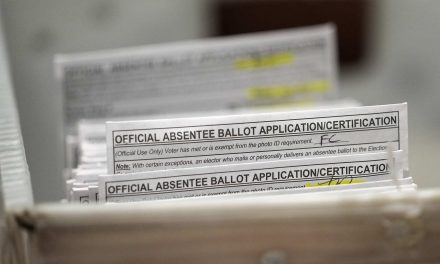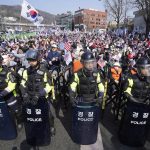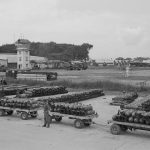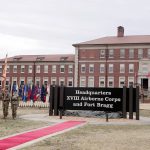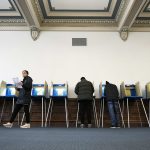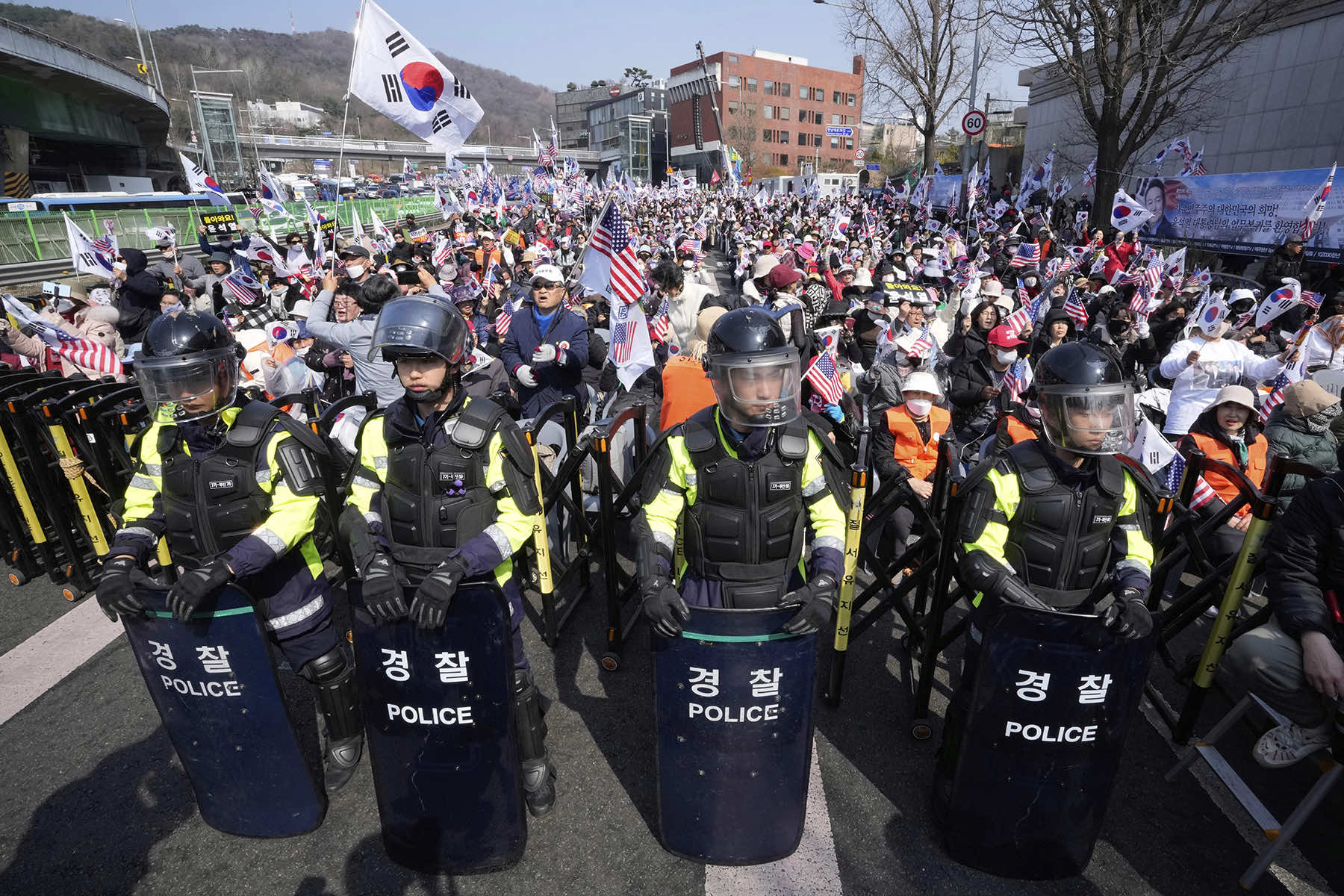
South Korea’s Constitutional Court removed impeached President Yoon Suk Yeol from office on April 4, ending his tumultuous presidency four months after he threw South Korean politics into turmoil with an ill-fated declaration of martial law and setting up an election to replace him.
The unanimous verdict capped a dramatic fall for Yoon, a former star prosecutor who went from political novice to president in just a year.
In a nationally televised verdict, the court’s acting chief Moon Hyung-bae said the eight-member bench upheld Yoon’s impeachment because his martial law decree seriously violated the constitution and other laws.
“The defendant not only declared martial law, but also violated the constitution and laws by mobilizing military and police forces to obstruct the exercise of legislative authority,” Moon said, “Ultimately, the declaration of martial law in this case violated the substantive requirements for emergency martial law.”
“Given the grave negative impact on constitutional order and the significant ripple effects of the defendant’s violations, we find that the benefits of upholding the constitution by removing the defendant from office far outweigh the national losses from the removal of a president,” the justice concluded.
At an anti-Yoon rally near the old royal palace that dominates downtown Seoul, People erupted into jubilant tears and dancing when the verdict was announced. Two women wept as they hugged and an old man near them leapt to his feet and screamed with joy.
But a festering national divide over Yoon’s impeachment will likely continue. It will also complicate South Korea’s efforts to deal with President Donald Trump’s “America First” policies and North Korea’s expanding ties with Russia.
One of Yoon’s lawyers, Yoon Kap-keun, called the ruling “completely incomprehensible” and a “pure political decision,” but the former president did not immediately issue a statement. Yoon’s ruling People Power Party said it would accept the decision.
Prime Minister Han Duck-soo, the country’s acting leader, in a televised speech vowed to ensure “there are no gaps in national security and diplomacy” and maintain public safety and order.
“Respecting the will of our sovereign people, I will do my utmost to manage the next presidential election in accordance with the constitution and the law, ensuring a smooth transition to the next administration,” Han said.
A national election must be held within two months to select a new president. Surveys show Lee Jae-myung, leader of the main opposition Democratic Party, is the early favorite, although he is facing trials for corruption and other charges.
Martial law lasted only six hours, but left behind a political crisis, rattling financial markets and unsettling the country’s diplomatic partners. In January, Yoon was separately arrested and indicted by prosecutors on alleged rebellion in connection with his decree, a charge that carries the death penalty or a life sentence if convicted.
Under Yoon’s decree, the first of its kind in more than 40 years, hundreds of soldiers were dispatched to the assembly, election offices and other sites. Special operations soldiers smashed windows at the National Assembly and scuffled with citizens gathered to protest, shocking South Koreans and evoking traumatic memories of military rule.
Enough lawmakers, including some from his own ruling People Power Party, managed to enter the assembly and vote down his decree unanimously.
No major violence occurred during the brief period of martial law, but some senior military and police officers sent to the assembly have testified that Yoon ordered them to drag out lawmakers to block a vote on his decree or to detain his political rivals. Yoon says the troops were deployed to the assembly simply to maintain order.
Yoon, 64, a conservative, was impeached by the liberal opposition-controlled National Assembly on Dec. 14. The assembly accused him of violating the constitution and other laws by suppressing assembly activities, attempting to detain politicians, and undermining peace across the country.
In his final testimony at the Constitutional Court hearing, Yoon said his decree was a desperate attempt to draw public support of his fight against the “wickedness” of the main liberal opposition Democratic Party, which had obstructed his agenda, impeached top officials and slashed the government’s budget bill. He earlier called the National Assembly “a den of criminals” and “anti-state forces.”
Some experts say Yoon may have imposed military rule to head off a possible independent investigation into scandals involving his wife, Kim Keon Hee.
In the past few months, millions of people have taken to the streets to rally for or against Yoon, deepening the country’s already serious conservative-liberal divide. The Constitutional Court ruling that removed Yoon from office will likely intensify pro-Yoon demonstrations, experts say.
Without presidential immunity, Yoon could face other criminal charges, such as abuse of power. He’s the first South Korean president to be arrested or indicted while in office.
Yoon served as prosecutor-general under his predecessor, liberal President Moon Jae-in, before joining the now-ruling party in 2021 following disputes with Moon allies. A public image as strong-minded and uncompromising helped him defeat Lee in the close-fought 2022 presidential election. But after becoming president, Yoon has faced criticism that he refused to replace officials implicated in scandals and vetoed many bills passed by the assembly.
On foreign policy, Yoon pushed hard to bolster South Korea’s military alliance with the United States and overcome long-running disputes with Japan over historical traumas. He said that a greater Seoul-Washington-Tokyo security partnership is essential to coping with North Korea’s growing nuclear threats. Critics of Yoon accused him of unnecessarily provoking North Korea and neglecting relations with China, South Korea’s biggest trading partner.
South Koreans demonstrated the courage and constitutional commitment to remove a president who tried to subvert democracy through force. They upheld the rule of law even as their nation risked instability. In contrast, the United States, long a self-proclaimed model of democratic values, chose to return a twice impeached convicted felon to the White House. As South Korea confronts its past to protect its future, America stands diminished, having embraced authoritarianism at the ballot box.
Timeline of events:
December 1
According to the criminal indictment, Yoon meets with Defense Minister Kim Yong Hyun to discuss gridlock in the National Assembly as opposition lawmakers use their majority to impeach senior officials and prosecutors and cut government budgets. Prosecutors say Yoon told Kim he wanted to take “emergency measures” against the liberals, something they allege he had been saying for months.
December 3
In a surprise announcement televised at 10:29 p.m., Yoon tells the nation he’s declaring martial law, saying the National Assembly has become a “den of criminals” paralyzing government affairs.
Yoon vows to “eradicate” his political rivals, describing them as North Korea-sympathizing “anti-state forces” and “the main culprits of our nation’s downfall.” He doesn’t offer direct evidence to back his claims.
As lawmakers begin rushing to the National Assembly, the military’s martial law command issues a proclamation declaring sweeping government powers, including the suspension of political parties’ activities and other political gatherings that could cause “social confusion” and control over media and publications. It says anyone who violates the decree can be arrested without a warrant.
Hundreds of heavily armed troops encircle the Assembly, apparently to prevent lawmakers from gathering to vote on the martial law declaration, while opposition Democratic Party leader Lee Jae-myung live-streams his journey from a car, calling for people to converge on the parliament to help lawmakers get inside. The shaky footage shows him climbing over a fence to reach the grounds.
December 4
Shortly after midnight, National Assembly Speaker Woo Won Shik says on his YouTube channel that the Assembly will respond to Yoon’s martial law declaration with “constitutional procedure.”
Woo reaches the Assembly’s main chamber around 12:35 a.m., as troops break windows to enter the Assembly but fail to reach the main chamber. Woo opens a meeting at 12:47 a.m. to vote on lifting martial law.
At around 1 a.m., 190 lawmakers, including 18 from Yoon’s own conservative People Power Party, vote unanimously to lift martial law. Troops and police begin to retreat from the Assembly shortly after.
At 4:30 a.m., martial law is formally lifted following a Cabinet meeting.
December 5
Yoon replaces Defense Minister Kim Yong Hyun, a close ally who had a key role in mobilizing troops to enforce martial law. Han Dong-hun, the leader of Yoon’s party but a factional rival, says he will work to defeat the opposition-led impeachment motion despite criticizing martial law as “unconstitutional.”
December 6
In a bombshell reversal, Han supports suspending Yoon’s constitutional powers, saying that the president poses a “significant risk of extreme actions, like reattempting to impose martial law, which could potentially put the Republic of Korea and its citizens in great danger.”
December 7
Yoon apologizes and says he won’t shirk legal or political responsibility for declaring martial law. He also says he would leave it to his party to chart a course through the country’s political turmoil, “including matters related to my term in office.” Yoon survives an impeachment vote boycotted by most ruling party lawmakers.
December 8
Prosecutors detain former defense minister Kim over his alleged role in planning and executing the declaration of martial law.
December 9
South Korea’s Justice Ministry bans Yoon from traveling overseas as investigations into allegations of rebellion and other charges are expanded.
December 10
Kwak Jong-keun, commander of the Army Special Warfare Command whose troops were sent to parliament after Yoon declared martial law, tells lawmakers that he received direct instructions from the former defense minister to obstruct them from entering the National Assembly’s main chamber in order to prevent it from gathering a quorum to overturn Yoon’s martial law order.
Kwak says Yoon later called him directly and asked for the troops to “quickly destroy the door and drag out the lawmakers who are inside.” Kwak says he did not carry out Yoon’s orders.
December 11
Kim, the former defense minister, is formally arrested over his alleged collusion with Yoon and others in imposing martial law.
South Korean police send officers to search Yoon’s office for evidence related to the martial law introduction but they are blocked from entering the compound by Yoon’s security team.
Police detain the national police chief and the top police officer for Seoul over their roles in enforcing Yoon’s martial law orders.
December 12
Yoon defends his martial law decree as an act of governance and denies rebellion charges, vowing to “fight to the end” in the face of attempts to impeach him.
The National Assembly passes motions to impeach national police chief Cho Ji Ho and Justice Minister Park Sung Jae, suspending them from official duties, over their alleged roles in the enforcement of martial law.
December 14
The National Assembly impeaches Yoon on a 204-85 vote. His presidential powers and duties are suspended and Prime Minister Han Duck-soo, the country’s No. 2 official, takes over.
December 27
The National Assembly votes to impeach Han as acting president over his unwillingness to fill vacancies on the bench of the Constitutional Court.
December 31
The Seoul Western District Court issues a warrant to detain Yoon for questioning.
January 3
Dozens of investigators arrive at the presidential residence in Seoul in an attempt to detain Yoon, but are blocked by presidential security forces and vehicle barricades.
January 7
The chief of the presidential security service, Park Jong-joon, resigns.
January 14
The Constitutional Court holds its first formal hearing on Yoon’s impeachment, which lasts less than five minutes because Yoon refuses to attend.
January 15
Anti-corruption investigators and police raid the presidential compound and detain Yoon, who is the first sitting president to be detained.
January 19
The Seoul Western District Court grants law enforcement’s request for a formal arrest warrant for Yoon, citing concerns he could destroy evidence. His arrest triggers a riot by his supporters, who break into the court, smashing windows and equipment. Nearly 90 of them are arrested.
January 26
The Seoul Central District Prosecutors’ Office indicts Yoon on charges of masterminding an attempted rebellion, describing his power grab as an illegal bid to seize the legislature and election offices and arrest political opponents.
March 7
The Seoul Central District Court orders Yoon released from detention, citing unresolved issues about whether investigators had the proper authority to detain him. He is released the following day.
March 24
The Constitutional Court overturns the legislature’s impeachment of Prime Minister Han, restoring his powers as acting leader.
April 4
The Constitutional Court upholds Yoon’s impeachment and removes him as president, forcing an election within 60 days to choose his successor.

